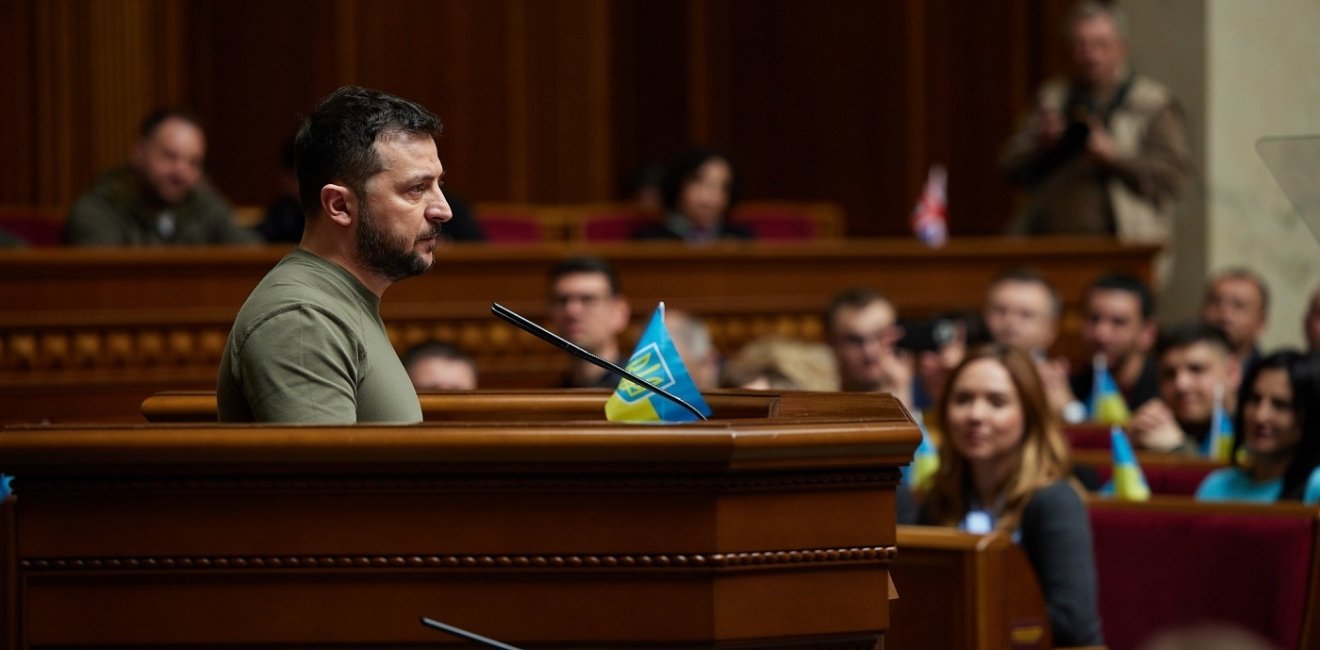
A blog of the Kennan Institute
Ukraine continues manifesting its hardiness under the least favorable conditions. War entered the country first with the shock of 2014, with the revolutionary change of government, Russian illegal annexation of Crimea, and the start of the Donbas war. Then came the Minsk Agreements, reforms, and the ideological turn of 2015, followed by “normalization” of wartime politics in 2016–17 and the growth of internal competition and Putin’s menace in 2018. There was hope for new leadership in 2019, and then the quest for survival under the war and pandemic conditions from 2020 to ‘21. There has been firm social and economic resilience in the face of the Russian invasion in 2022.
War is usually hostile to democracy. But Ukraine demonstrates resilience also on that front: despite the bombing, the chances for competitive politics remain high, despite martial law’s limitations.
Competing groups
The parliamentary elections—under normal conditions, scheduled for October 2023—will probably be postponed until after the war, and for good reason. The mass media sector has numerous issues and needs time to prepare for a national debate. Hundreds of thousands of Ukrainians are on the front, and over 13 million have left their homes as either internally displaced people or refugees to countries abroad. Local self-government is now civil-military administration. Political competition would seem unlikely under such conditions.
But the Ukrainian political system seems to be alive and kicking. Some old cleavages have survived the war: the struggle between the Zelensky and the Poroshenko camps is still in place. The rift between the presidential office and the “mayor’s party,” headed by Kyiv’s mayor Klitschko, comes to the surface from time to time.
But recent polls show that there could be more groups on the current political map than just these. Probably the most telling is the poll that the Razumkov Center conducted recently (February 22–March 1, 2023). While measuring Ukrainians’ assessment of the situation in their country, the pollsters could see which leaders—from institutions, individuals, and parties—the public trusts today.
Among the most trusted public institutions are the army (96 percent of respondents trust it) [1], volunteer organizations (88 percent), the president (83 percent), the church (70 percent), NGOs (66 percent), Ukrainian media (65 percent), heads of local administrations (62 percent), ombudspersons (52 percent), and the government (50 percent). The least trusted include officials (64 percent do not trust them), political parties (63 percent), courts (59 percent), and the Verkhovna Rada of Ukraine (51 percent).
Poll respondents were split on the question of whether corruption has changed since the start of the Russian invasion: 33 percent believe that the level of corruption grew, 30 percent believe it did not change, and 21 percent think it decreased (the rest abstained).
In terms of politicians and public figures, the respondents most often expressed trust in Volodymyr Zelensky (85 percent trust him), ex-comedian and current popular volunteer Serhiy Prytula (65 percent), presidential aide Mykhailo Podoliak (59.5 percent), Vitaly Klitschko (58 percent), security council secretary Oleksiy Danilov (55 percent), Prime Minister Denys Shmyhal (52 percent), and Minister of Defense Oleksiy Reznikov (51 percent). The least trusted figures include Yuri Boyko (82 percent do not trust him), Yuliya Tymoshenko (76 percent), Petro Poroshenko (65 percent), and Oleksiy Arestovych (59 percent).
This poll omitted General Valery Zaluzhny, but he must also be included among the key political figures, since he was named in January 2023, by popular vote, the second “most popular politician” of 2022. Oleksiy Arestovych can be included in the mix too, since businessmen and experts around him may turn into a new political force.
This poll and several others [2] show some leaders who may oppose Zelensky and his party in future presidential and parliamentary elections. Among them are Zaluzhny and Prytula who enjoy vast national trust. Some growth in political weight has also been demonstrated by Klitschko. If General Zaluzhny is a professional soldier who, so far, has stayed away from politics, Prytula and Klitschko both are involved in their political parties in a way that could be important for future elections.
Setting the framework for future competition
Political diversity is currently limited by the war and by national wartime consensus, which is expressed in minimal criticism towards the president and commander in chief. So, the major competition is about chances to win in the future. The framework of these elections is being currently debated around three draft laws that prescribe the role of the military, the freedom of mass media, and the spectrum of parties allowed in the country.
The debate on the role of the military concerns a draft law on the strengthening of democratic civilian control over the Armed Forces of Ukraine (#4210). This draft was conceived in 2020 and approved in the first reading just before the invasion, on February 16, 2022. Among other measures, it proposes giving control of the army’s commander to the minister of defense. In the current context, this draft law has become politicized, an issue for debate between those who support and those who oppose a greater role for the military in the political system.
The quality of future elections will depend on how free mass media is. In December 2022, a new law on mass media was approved in Ukraine and immediately sparked debates. The law prescribes new rules for broadcasting, on-demand media services, video-sharing platforms, print and online media, and electronic communications operators—rules for the period of armed aggression, and up to five years thereafter. The current debate focuses on the harmony between this law’s norms with the norms of the EU and the Council of Europe, which ensure the media freedom necessary for functional democracy.
Yet in May 2022, the Ukrainian government banned all pro-Russian parties. In March 2023, a number of the MPs from the Servant of People and the Voice parties proposed an “anti-Kremlin lustration” act, which envisions a ban on participation in elections for all those who were members of parliament or on local councils representing the prohibited (pro-Russian) parties (Art. I-3). This initiative has launched a debate which will define who gets to participate in future political campaigns in Ukraine.
War stopped neither public debate nor political competition in Ukraine. The results of the ongoing debates will define the framework of future elections and Ukrainian democracy in the postwar period. Ultimately, they will also define the speed of Ukraine’s European and Euro-Atlantic integration.
[1] Trust in the other defense and security institutions fell between 86 and 74 percent.
[2] See the recent polls of the Kyiv International Institute of Sociology and the Rating Sociological Group. According to the Opora poll, over 80 percent of Ukrainian refugees in Poland would participate in the elections.
Author


Kennan Institute
After more than 50 years as a vital part of the Wilson Center legacy, the Kennan Institute has become an independent think tank. You can find the current website for the Kennan Institute at kennaninstitute.org. Please look for future announcements about partnership activities between the Wilson Center and the Kennan Institute at Wilson Center Press Room. The Kennan Institute is the premier US center for advanced research on Eurasia and the oldest and largest regional program at the Woodrow Wilson International Center for Scholars. The Kennan Institute is committed to improving American understanding of Russia, Ukraine, Central Asia, the South Caucasus, and the surrounding region through research and exchange. Read more

Explore More in Focus Ukraine
Browse Focus Ukraine
Talking to the Dead to Heal the Living

Ukrainian Issue in Polish Elections


